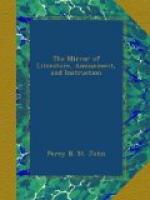Those who were only governors, had the title of ealderman
of such a county, or sometimes in Latin by the term
consul. The first administered justice
in their own name, and appropriated to their own use
all the revenues and profits of their respective counties.
The last administered justice in the king’s
name and had only part of the profits assigned them.
A third sort of ealdermen were those, who upon account
of their high birth, bore the title, without any authority,
out of which rank the governors were generally chosen.
There were also inferior ealdermen in cities or boroughs,
who administered justice in the king’s name,
and were dependent on the great ealdermen, or earls,
which by the name of
alderman still continues
among us to those inferior officers, while they are
called earls only. The office of the ealderman
was wholly civil, and had nothing to do with either
military or ecclesiastical affairs. What power
each of them had, it is not easy to determine; but
they were all obliged to have some knowledge of the
law. In the Saxon times, the bishop and ealderman
sat together to try causes; the one proceeded by the
canons, the other by the common law. Part of
the ealderman’s jurisdiction was to examine the
arms, and to raise the militia within such a district,
in order to suppress riot and execute the sentence
of a court of justice. He had likewise the cognizance
of house-breaking, robbing, &c. Nor was it lawful
for any person to move from one place to another without
a certificate from the ealderman.
HALBERT H.
* * * *
*
THE GATHERER.
A snapper up of unconsidered trifles.
SHAKSPEARE.
* * * *
*
HANDSOME BAR-MAIDS.
The following advertisement appeared in a New Orlean’s
journal:—Wanted, two handsome ladies to
assist in two bar-rooms, and to whom liberal wages
will be given. Beauties from New York, Charlestown,
or Savannah will be preferred. A well-shaped,
well-looking black lady would meet encouragement as
an under bar-maid. Due attention will be paid
to applicants, at No. 60, Camp-street.
W.G.C.
* * * *
*
FRENCH MATRIMONIAL ADVERTISEMENTS.
Matrimonial advertisements being standard articles
in our own newspapers at this period, as a pleasantry
they may be compared with the following, extracted
from various French journals:—
Une demoiselle bien nee et aimable, ayant 120,000
francs de bien, desire epouser un homme age et riche.
Une demoiselle de 24 ans, jolie et d’une education
distinguee, ayant 40,000 francs comptant, et par la
suite 200,000 francs, desire epouser un jeune homme
aimable, et ayant de la fortune.
Une demoiselle de 19 ans, sans fortune, mais jolie,
aimable, et bien elevee, desire epouser une homme
age, et assez aise, pour pouvoir faire quelque bien
a sa mere.




